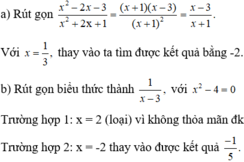(x2 +x+1)(6-2x)=0
Hãy nhập câu hỏi của bạn vào đây, nếu là tài khoản VIP, bạn sẽ được ưu tiên trả lời.


1) Ta có: \(x^2-4x+4=0\)
\(\Leftrightarrow\left(x-2\right)^2=0\)
\(\Leftrightarrow x-2=0\)
hay x=2
Vậy: S={2}

\(a.\left(x^2-2x+1\right)-4=0\\\Leftrightarrow \left(x-1\right)^2-2^2=0\\\Leftrightarrow \left(x-1-2\right)\left(x-1+2\right)=0\\ \Leftrightarrow\left(x-3\right)\left(x+1\right)=0\\\Leftrightarrow \left[{}\begin{matrix}x-3=0\\x+1=0\end{matrix}\right.\Rightarrow\left[{}\begin{matrix}x=3\\x=-1\end{matrix}\right.\)
Vậy tập nghiệm của phương trình trên là \(S=\left\{3;-1\right\}\)
\(b.x^2-x=-2x+2\\\Leftrightarrow x^2-x+2x-2=0\\\Leftrightarrow x\left(x-1\right)+2\left(x-1\right)=0\\\Leftrightarrow \left(x+2\right)\left(x-1\right)=0\\\Leftrightarrow \left[{}\begin{matrix}x+2=0\\x-1=0\end{matrix}\right.\Rightarrow\left[{}\begin{matrix}x=-2\\x=1\end{matrix}\right.\)
Vậy tập nghiệm của phương trình trên là \(S=\left\{-2;1\right\}\)
\(c.4x^2+4x+1=x^2\\ \Leftrightarrow4\left(x^2+x+\frac{1}{4}\right)-x^2=0\\ \Leftrightarrow4\left(x+\frac{1}{2}\right)^2-x^2=0\\ \Leftrightarrow\left[2\left(x+\frac{1}{2}\right)-x\right]\left[2\left(x-\frac{1}{2}\right)+x\right]=0\\ \Leftrightarrow\left[{}\begin{matrix}2\left(x+\frac{1}{2}\right)-x=0\\2\left(x+\frac{1}{2}\right)+x=0\end{matrix}\right.\Rightarrow\left[{}\begin{matrix}2x+1-x=0\\2x+1+x=0\end{matrix}\right.\Rightarrow\left[{}\begin{matrix}x=-1\\x=-\frac{1}{3}\end{matrix}\right.\)
Vậy tập nghiệm của phương trình trên là \(S=\left\{-1;-\frac{1}{3}\right\}\)

a) Ta có: \(\left(x^2-5x\right)^2+10\left(x^2-5x\right)+24=0\)
\(\Leftrightarrow\left(x^2-5x\right)^2+4\left(x^2-5x\right)+6\left(x^2-5x\right)+24=0\)
\(\Leftrightarrow\left(x^2-5x\right)\left(x^2-5x+4\right)+6\left(x^2-5x+4\right)=0\)
\(\Leftrightarrow\left(x^2-5x+6\right)\left(x^2-5x+4\right)=0\)
\(\Leftrightarrow\left(x^2-2x-3x+6\right)\left(x^2-x-4x+4\right)=0\)
\(\Leftrightarrow\left[x\left(x-2\right)-3\left(x-2\right)\right]\left[x\left(x-1\right)-4\left(x-1\right)\right]=0\)
\(\Leftrightarrow\left(x-1\right)\left(x-2\right)\left(x-3\right)\left(x-4\right)=0\)
\(\Leftrightarrow\left[{}\begin{matrix}x-1=0\\x-2=0\\x-3=0\\x-4=0\end{matrix}\right.\Leftrightarrow\left[{}\begin{matrix}x=1\\x=2\\x=3\\x=4\end{matrix}\right.\)
Vậy: S={1;2;3;4}
b) Ta có: \(\left(2x+1\right)^2-2x-1=2\)
\(\Leftrightarrow\left(2x+1\right)^2-\left(2x+1\right)-2=0\)
\(\Leftrightarrow\left(2x+1\right)^2-2\left(2x+1\right)+\left(2x+1\right)-2=0\)
\(\Leftrightarrow\left(2x+1\right)\left(2x+1-2\right)+\left(2x+1-2\right)=0\)
\(\Leftrightarrow\left(2x+1+1\right)\left(2x-1\right)=0\)
\(\Leftrightarrow\left(2x+2\right)\left(2x-1\right)=0\)
\(\Leftrightarrow\left[{}\begin{matrix}2x+2=0\\2x-1=0\end{matrix}\right.\Leftrightarrow\left[{}\begin{matrix}2x=-2\\2x=1\end{matrix}\right.\Leftrightarrow\left[{}\begin{matrix}x=-1\\x=\dfrac{1}{2}\end{matrix}\right.\)
Vậy: \(S=\left\{-1;\dfrac{1}{2}\right\}\)
c) Ta có: \(x\left(x-1\right)\left(x^2-x+1\right)-6=0\)
\(\Leftrightarrow x\left(x^3-x^2+x-x^2+x-1\right)-6=0\)
\(\Leftrightarrow x\left(x^3-2x^2+2x-1\right)-6=0\)
\(\Leftrightarrow x^4-2x^3+2x^2-x-6=0\)
\(\Leftrightarrow x^4-2x^3+2x^2-4x+3x-6=0\)
\(\Leftrightarrow x^3\left(x-2\right)+2x\left(x-2\right)+3\left(x-2\right)=0\)
\(\Leftrightarrow\left(x-2\right)\left(x^3+2x+3\right)=0\)
\(\Leftrightarrow\left(x-2\right)\left(x^3-x+3x+3\right)=0\)
\(\Leftrightarrow\left(x-2\right)\left[x\left(x^2-1\right)+3\left(x+1\right)\right]=0\)
\(\Leftrightarrow\left(x-2\right)\left[x\left(x-1\right)\left(x+1\right)+3\left(x+1\right)\right]=0\)
\(\Leftrightarrow\left(x-2\right)\left(x+1\right)\left(x^2-x+3\right)=0\)
mà \(x^2-x+3>0\forall x\)
nên (x-2)(x+1)=0
\(\Leftrightarrow\left[{}\begin{matrix}x-2=0\\x+1=0\end{matrix}\right.\Leftrightarrow\left[{}\begin{matrix}x=2\\x=-1\end{matrix}\right.\)
Vậy: S={2;-1}
d) Ta có: \(\left(x^2+1\right)^2+3x\left(x^2+1\right)+2x^2=0\)
\(\Leftrightarrow\left(x^2+1\right)^2+2x\left(x^2+1\right)+x\left(x^2+1\right)+2x^2=0\)
\(\Leftrightarrow\left(x^2+1\right)\left(x^2+1+2x\right)+x\left(x^2+1+2x\right)=0\)
\(\Leftrightarrow\left(x+1\right)^2\cdot\left(x^2+x+1\right)=0\)
mà \(x^2+x+1>0\forall x\)
nên x+1=0
hay x=-1
Vậy: S={-1}

tham khảo
https://hoidapvietjack.com/q/57243/giai-cac-phuong-trinh-sau-a-2x12-2x-12-b-x2-3x-2-5x2-3x60
b) (2x+1)2-2x-1=2
\(< =>4x^2+4x+1-2x-1=2\)
\(< =>4x^2+2x-2=0\)
\(< =>4x^2+4x-2x-2=0\)
\(< =>\left(4x^2+4x\right)-\left(2x+2\right)=0\)
\(< =>4x\left(x+1\right)-2\left(x+1\right)=0\)
\(< =>\left(x+1\right)\left(4x-2\right)=0\)
\(=>\left\{{}\begin{matrix}x+1=0=>x=-1\\4x-2=0=>x=\dfrac{1}{2}\end{matrix}\right.\)
Vậy....

a: (2x+1)(3-x)(4-2x)=0
=>(2x+1)(x-3)(x-2)=0
hay \(x\in\left\{-\dfrac{1}{2};3;2\right\}\)
b: 2x(x-3)+5(x-3)=0
=>(x-3)(2x+5)=0
=>x=3 hoặc x=-5/2
c: =>(x-2)(x+2)+(x-2)(2x-3)=0
=>(x-2)(x+2+2x-3)=0
=>(x-2)(3x-1)=0
=>x=2 hoặc x=1/3
d: =>(x-2)(x-3)=0
=>x=2 hoặc x=3
e: =>(2x+5+x+2)(2x+5-x-2)=0
=>(3x+7)(x+3)=0
=>x=-7/3 hoặc x=-3
f: \(\Leftrightarrow2x^3+5x^2-3x=0\)
\(\Leftrightarrow x\left(2x^2+5x-3\right)=0\)
\(\Leftrightarrow x\left(x+3\right)\left(2x-1\right)=0\)
hay \(x\in\left\{0;-3;\dfrac{1}{2}\right\}\)

1.
\(x^2-5x+6=0\\ \Rightarrow x^2-2x-3x+6=0\\ \Rightarrow\left(x^2-2x\right)-\left(3x-6\right)=0\\ \Rightarrow x\left(x-2\right)-3\left(x-2\right)=0\\ \Rightarrow\left(x-2\right)\left(x-3\right)=0\\ \Rightarrow\left[{}\begin{matrix}x-2=0\\x-3=0\end{matrix}\right.\\ \Rightarrow\left[{}\begin{matrix}x=2\\x=3\end{matrix}\right.\)
2.
\(\left(x+4\right)^2-\left(3x-1\right)^2=0\\ \Rightarrow\left(x+4-3x+1\right)\left(x+4+3x-1\right)=0\\ \Rightarrow\left(-2x+5\right)\left(4x+3\right)=0\\ \Rightarrow\left[{}\begin{matrix}-2x+5=0\\4x+3=0\end{matrix}\right.\\ \Rightarrow\left[{}\begin{matrix}x=\dfrac{5}{2}\\x=-\dfrac{3}{4}\end{matrix}\right.\)
3.
\(x^2-2x+24=0\\ \Rightarrow\left(x^2-2x+1\right)+23=0\\ \Rightarrow\left(x-1\right)^2+23=0\)
Vì (x-1)2≥0
23>0
\(\Rightarrow\left(x-1\right)^2+23>0\)
Vậy x vô nghiệm
4.
\(9x^2-4=0\\ \Rightarrow\left(3x-4\right)\left(3x+4\right)=0\\ \Rightarrow\left[{}\begin{matrix}3x-4=0\\3x+4=0\end{matrix}\right.\\ \Rightarrow\left[{}\begin{matrix}x=\dfrac{4}{3}\\x=-\dfrac{4}{3}\end{matrix}\right.\)
5.
\(x^2+2x-8=0\\ \Rightarrow\left(x^2+2x+1\right)-9=0\\ \Rightarrow\left(x+1\right)^2-3^2=0\\ \Rightarrow\left(x-2\right)\left(x+4\right)=0\\ \Rightarrow\left[{}\begin{matrix}x-2=0\\x+4=0\end{matrix}\right.\\ \Rightarrow\left[{}\begin{matrix}x=2\\x=-4\end{matrix}\right.\)

ta có
\(x^2+x+1=\left(x^2+2\times\frac{1}{2}\times x+\frac{1}{4}\right)+1-\frac{1}{4}\)
\(=\left(x+\frac{1}{2}\right)^2+\frac{3}{4}\)
\(\Rightarrow x^2+x+1>0\)
Mà \(\left(x^2+x+1\right)\left(6-2x\right)=0\)
\(\Leftrightarrow6-2x=0\)
\(\Leftrightarrow x=3\)
Vậy ....................
Ta có : \(\left(x^2+x+1\right)\left(6-2x\right)=0\)
Mà \(x^2+x+1=\left(x+\frac{1}{2}\right)^2+\frac{3}{4}\ge\frac{3}{4}\ne0\forall x\)
\(\Rightarrow6-2x=0\)
\(\Rightarrow2x=6\)
\(\Rightarrow x=3\)
Vậy \(x=3\)